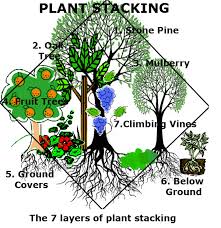Permaculture in the Gardens of Love
Permaculture provides a lot of tools, as well as scientific explanations of why it works better to grow plants in a mix and why it will be less work, and give more harvest in the long run if we plant perennial plants, and don't dig over the soil every year:
- The growing of perennial crops means the soil is covered with plants all year in most places and doesn't need to be disturbed. This, in combination with annual leaf fall, and the ability of many trees to bring up nutrients from deep within the soil, means organic matter can be build up more effectively, like in a forest.
- Once perennial plants are established, they need less care than annual crops, as there is no preparing the soil and planting and clearing up every season, or even several times in the year and therefore less weeding because there is less bare soil.
- Planting a mix of different plants makes the crops less vulnerable to pests and diseases, because it's harder to find a large amount of the same species to eat or infect. The greater the variety of plants the more habitats for different species of animals and insects to live on the land, which in turn leads to a more balanced ec
 osystem with more predators for pests, and therefore less pests.
osystem with more predators for pests, and therefore less pests. - A forest of mixed species is one of the most stable ecosystems on earth. Here the energy that comes in is used to the fullest, with tree layers, then shrubs, smaller plants, and climbers as well, growing at different heights, and depths. It offers many places in space as well as time for all sorts of creatures to live together.
- Permaculture also teaches a lot of useful techniques and ideas for how to set up a garden or farm, inspired by the way natural processes and systems work.
We can use these ideas in our Garden design. It has inspired many solutions presented in the second part of the Growing gardens of Love book:
-garden shape, pond and reservoir building, house design, the use of a greenhouse as part of the home, logical things like placing animal housing near paths, easy to reach from the home, henhouse design etc.
